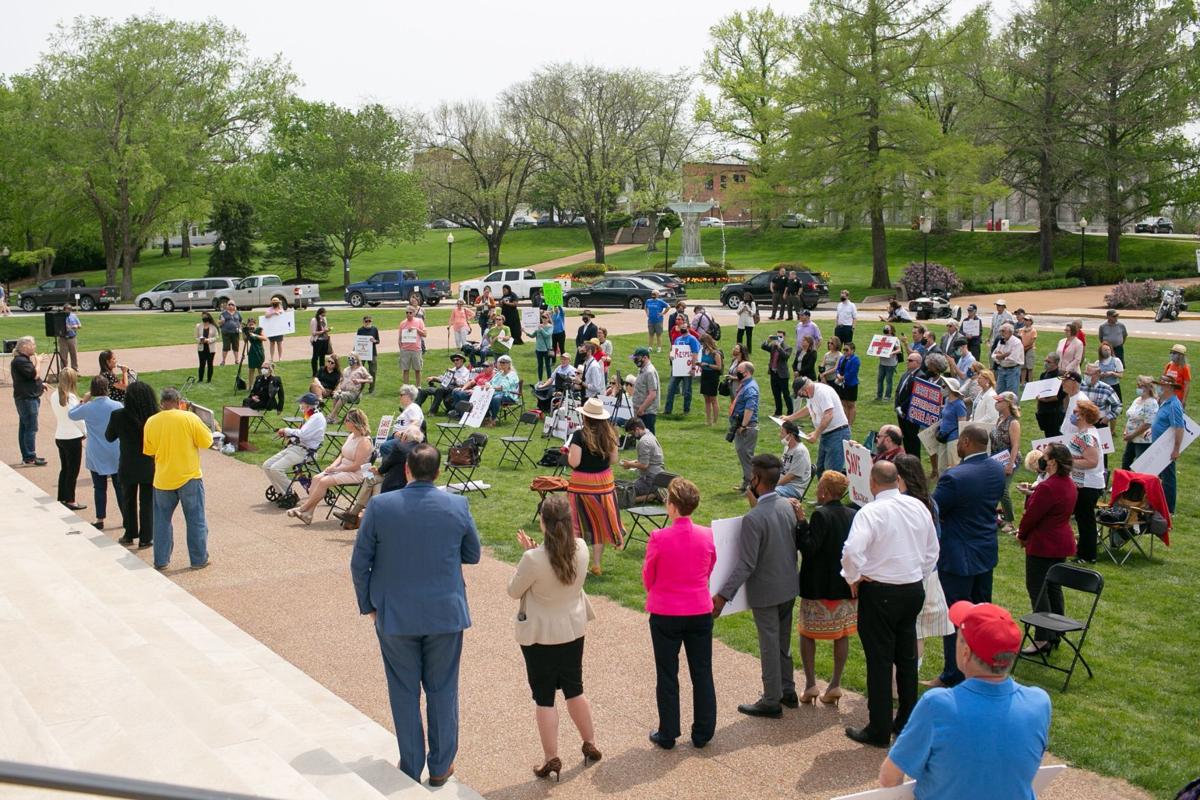JEFFERSON CITY┬ĀŌĆö Joining their Republican colleagues in the House, the GOP-controlled Missouri Senate torpedoed funding for a voter-approved expansion of Medicaid in an emotional and partisan debate late Wednesday.
The controversial decision came despite 53% of Missouri voters choosing to expand the government-funded health insurance program through a constitutional amendment last August.
The maneuver affects as many 275,000 low-income Missourians, leaving the state facing potential legal action when the expanded population is allowed to begin signing up for Mo HealthNet benefits on July 1 as part of the constitutional change.
At issue was a Democratic amendment to the $34 billion spending plan that called for funding the expansion at the same level proposed by Republican Gov. Mike Parson in January.
Democrats felt forced to act after a Senate committee rejected additional funding for the expansion last week.
People are also reading…
The proposal, sponsored by Senate Minority Leader John Rizzo, D-Independence, failed on a 14-20 vote after Republicans claimed the state cannot afford the long-term costs of adding more people to the rolls.
ŌĆ£IŌĆÖm sorry, if you are a healthy adult, you need to get a job,ŌĆØ said Andrew Koenig, R-Manchester.
Rizzo said lawmakers have teed up the matter for a court battle.
ŌĆ£The people have finally weighed in on this. And now the Legislature is going to abdicate its duties and leave its responsibility to a judge?ŌĆØ Rizzo said. ŌĆ£I donŌĆÖt know what shark we have jumped here. God forbid the people have a voice.ŌĆØ
Some Republican supporters of expansion scoffed at GOP claims that the state canŌĆÖt afford the added cost.
ŌĆ£Obviously I think we should do it. We do have an influx of cash right now,ŌĆØ said Republican Sen. Lincoln Hough of Springfield. ŌĆ£The idea that we donŌĆÖt have the money to do this, I donŌĆÖt buy.ŌĆØ
Senate Floor Leader Caleb Rowden, R-Columbia, whose district supported the ballot measure, backed the added funding, despite his concern that it would hurt his political career.
ŌĆ£IŌĆÖve always voted my district and voted my conscience,ŌĆØ Rowden said.
All 10 Democrats backed the added funding. They were joined by four of the 24 Republicans.
The overall budget proposal contains no tax increases and would boost the pay of more than 50,000 state workers by at least 2%.
The budget includes 13 spending bills that fund state operations in the fiscal year beginning July 1.
But after more than six hours of wading through spending on schools, prisons and public safety, lawmakers zeroed in on Medicaid.
The 2020 ballot initiative, known as Amendment 2, called for the change in eligibility standards, but did not spell out a source for paying for it.
In his January budget proposal, Parson earmarked $1.9 billion to finance the expansion, with the state paying its share of $130 million.
The House earlier did not include the money to cover the additional enrollees, saying the state couldnŌĆÖt afford the long-term costs. A majority of senators shared that sentiment.
ŌĆ£The fundamental argument is how big we want the welfare state to be,ŌĆØ said Sen. Bob Onder, R-Lake Saint Louis.
Sen. Dan Hegeman, R-Cosby, who chairs the Senate Appropriations Committee, sided with the Republicans, said voters would have made a different decision if they had more information about the state budget and the future ŌĆ£unknownŌĆØ reliability of the federal government.
Democrats and expansion advocates have vowed to carry the fight to the courts.
ŌĆ£ItŌĆÖs not a Republican or Democratic issue. This is about how do we maintain a quality of life,ŌĆØ said Sen. Brian Williams, D-University City.
ŌĆ£This is what the people of Missouri want to do,ŌĆØ said Sen. Doug Beck, D-Affton.
Sen. Lauren Arthur, D-Kansas City, called the LegislatureŌĆÖs decision to override the will of the voters an ŌĆ£existential threatŌĆØ to democracy.
ŌĆ£Not funding Medicaid is wholly unacceptable,ŌĆØ Arthur said.
The state is not hurting for money to pay for the expansion. The current budget, which pays for state programs through June 30, will end the year with about $1 billion in unspent funds. The state also would receive an extra share an estimated $1.2 billion in federal dollars over the next two years if it moves forward with expansion.
Differences between the House and Senate versions will be hammered out by a special joint committee next week. That panel is not expected to revisit the Medicaid issue.
Among differences floated by the Senate include $7 million to help the stateŌĆÖs veterans homes, which were hard hit by the pandemic.
MissouriŌĆÖs cash-strapped public defender system also could get an influx of more than $3.6 million to 53 hire more attorneys under the Senate plan.
The Missouri Department of Labor would receive $48 million in federal aid to offset the agencyŌĆÖs overpayments for unemployment benefits to people who lost work during the pandemic.
The Senate also removed $15 million inserted into the budget by the House for the purchase of a gun club in the ║³└Ļ╩ėŲĄ area.
The Senate version also would allow for the restoration of twice-per-day service for Amtrak service between ║³└Ļ╩ėŲĄ and Kansas City.
The committee also could debate a House plan to pressure the Department of Health and Senior Services to suspend its cap on medical marijuana business licenses. The stateŌĆÖs controversial scoring system preceded hundreds of lawsuits last year by rejected applicants; the DHSS has spent millions of dollars in court to defend its licensing decisions.
The House plan would limit legal expenses at 5% of the medical marijuana programŌĆÖs total spending next year, and limit department spending discretion unless the license cap was lifted.
The budget legislation is
To listen to Senate debate on the budget, go to









